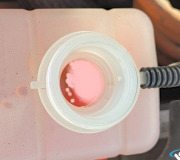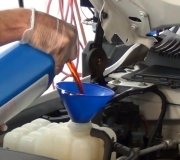Monday, November 17th, 2014 AT 12:28 PM
What are the disadvantages or damages that may occur if the reservoir for the antifreeze was filled ALL the way till the top cover of the reservoir. Why you should never over fill the reservoir for the antifreeze all the way up till the cover cap of the reservoir tank especially in cold freezing weather? What are the disadvantages or damages that may occur to the car (Ford 1998) if the reservoir for the antifreeze was over COMPLETELY filled : ALL the way till the top cap cover of the reservoir tank?



